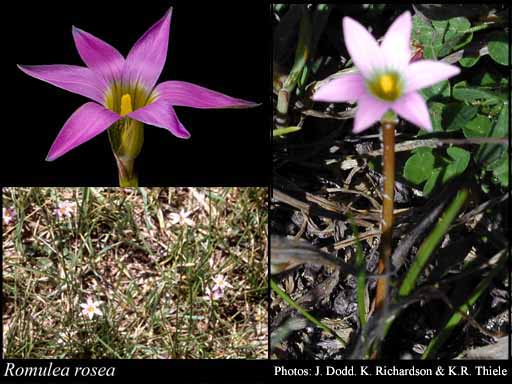- Reference
- Topogr.Verz.Pflanzensamml.Ecklon 19 (1827)
- Conservation Code
- Not threatened
- Naturalised Status
- Alien to Western Australia
- Name Status
- Current
Cormous, perennial, herb, to 0.25 m high. Fl. red-pink-purple-blue, Aug to Nov. White-grey sandy loam or clay, brown-red sandy loam, gravel, laterite, granite, limestone. Hills, flats, roadsides, pasture land.

Distribution
- IBRA Regions
- Avon Wheatbelt, Esperance Plains, Geraldton Sandplains, Jarrah Forest, Swan Coastal Plain, Warren.
- IBRA Subregions
- Dandaragan Plateau, Fitzgerald, Geraldton Hills, Katanning, Lesueur Sandplain, Merredin, Northern Jarrah Forest, Perth, Recherche, Southern Jarrah Forest, Warren.
- IMCRA Regions
- Leeuwin-Naturaliste, WA South Coast.
- Local Government Areas (LGAs)
- Albany, Armadale, Augusta Margaret River, Beverley, Bridgetown-Greenbushes, Broomehill-Tambellup, Busselton, Canning, Capel, Cockburn, Coorow, Cuballing, Cunderdin, Dandaragan, Dardanup, Denmark, Dumbleyung, Esperance, Gingin, Gnowangerup, Gosnells, Greater Geraldton, Harvey, Kalamunda, Manjimup, Melville, Moora, Mundaring, Murray, Narrogin, Nedlands, Northam, Perth, Pingelly, Plantagenet, Rockingham, South Perth, Stirling, Subiaco, Swan, Toodyay, Victoria Plains, Wagin, Wandering, Wanneroo, West Arthur, Wickepin, Williams, York.
Management Notes (for the Swan NRM Region)
Alternative Names. Onion Grass.
General Biology. Growth form. Geophyte. Life form. Annually renewed corm. Reproduction. Seed. Time to first flowering. 2 years. Seedbank persistence. Medium, 1-5 years. Fire response. Generally survives fire.
Notes. Known to be toxic to some stock.
Additional information. Origin. Southern Africa.
Suggested method of management and control. Spot spray metsulfuron methyl 0.2 g/15 L + Pulse® or 2.5-5 g/ha + Pulse® . Apply just on flowering at corm exhaustion. Read the manufacturers' labels and material safety data sheets before using herbicides. For further information consult the Australian Pesticides and Veterinary Medicines Authority to determine the status of permits for your situation or state.
Management Calendar
| Calendar Type | Jan | Feb | Mar | Apr | May | Jun | Jul | Aug | Sep | Oct | Nov | Dec | Comments |
|---|---|---|---|---|---|---|---|---|---|---|---|---|---|
| Dormant | Y | Y | Y | Y | |||||||||
| Active Growth | Y | Y | Y | Y | Y | Y | Y | Y | |||||
| Flowering | Y | Y | Y | ||||||||||
| Germination | Y | Y | Y | ||||||||||
| Optimum Treatment | Y | Y |
Legend: Y = Yes, regularly, O = Occasionally, U = Uncertain, referred by others but not confirmed.
References
- Brown, K. & Brooks, K. (2002) Bushland Weeds: A Practical Guide to their Management. Environmental Weeds Action Network, Greenwood.
- Dixon, B. & Keighery, G. (1995) Weeds and their control. In Managing Perths bushlands (eds. M. Scheltema and J. Harris). Greening Western Australia, Perth.
- Du Plessis, N. & Duncan G. (1989) Bulbous plants of Southern Africa. Tafelberg Publishers Ltd, Cape Town, South Africa.
- Hussey, B.M.J., Keighery, G.J., Dodd, J., Lloyd, S.G. & Cousens, R.D. (2007) Western Weeds. A guide to the weeds of Western Australia. 2nd Edition. The Plant Protection Society of Western Australia, Victoria Park.
- Manning, J., Goldblatt, P. & Snijman, D. (2002) The color encyclopedia of Cape bulbs. Timber Press, Portland, USA.
- US Food and Drug Administration (2006) FDA Poisonous Plant Database: Romulea rosea. URL: http://www.cfsan.fda.gov/~djw/pltx.cgi?QUERY=Romulea+rosea - Accessed December 2007.